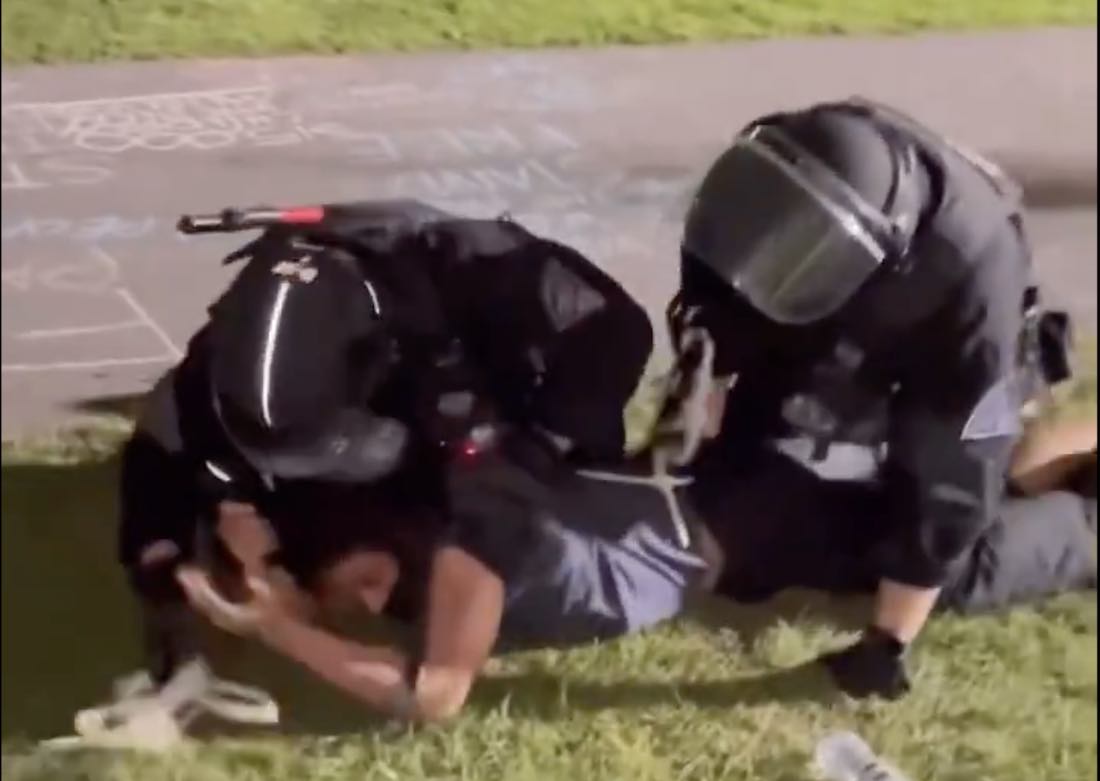latest
Clashes, 135 Arrests At UMass Amherst Protest

By Sophie Hauck
Campus police arrested 135 pro-Palestinian protestors at the University of Massachusetts Amherst late Tuesday night, hours after students established their second encampment this semester to demand the university divest from organizations connected to the defense industry and Israel.
UMass Chancellor Javier Reyes and other university officials met with a handful of protest organizers Tuesday afternoon to discuss the students’ demands and to ask them to dismantle the encampment, but participating students left the meeting saying they would not remove their tents and surrounding barriers until the university agreed to their proposed divestment strategy.
UMass Chancellor Javier Reyes and other university officials met with a handful of protest organizers Tuesday afternoon to discuss the students’ demands and to ask them to dismantle the encampment, but participating students left the meeting saying they would not remove their tents and surrounding barriers until the university agreed to their proposed divestment strategy.
In an email to students and UMass families Tuesday evening, Reyes wrote that after repeated warnings about an “unauthorized encampment on the South Lawn of the Student Union,” he asked the UMass Police Department to begin dispersing the crowd and dismantling the encampment as “the absolute last resort.”
“We have provided many paths forward for a resolution, including in our discussions today with protest representatives,” Reyes wrote. “While we have told demonstrators that failure to remove the tents and barriers may result in arrests, this is not the outcome we had hoped for.”
At approximately 8 p.m., police officers wearing riot gear surrounded the barricaded tents that students had set up earlier in the afternoon and began arresting a small group of faculty shielding the structure, before moving to detain those inside the encampment as hundreds of people looked on. As the night progressed, other students entered the encampment and barricaded themselves with signs before additional officers and State Police troopers arrived and took them into custody.
In videos posted on the UMass chapter of Students for Justice in Palestine Instagram account, police were seen tackling students who surrounded the encampment while shouting obscenities at the officers. In one video, officers tackled a protester running towards someone being tased on the ground, pushing down on the neck and head of the student who interfered.
Police zip-tied the hands of arrested protestors behind their backs and took them via bus to the campus police station or the Mullins Center for holding. They were released early Wednesday morning on $40 bail, which UMass SJP paid for using a bail fund they encouraged their social media followers to support.
In October, campus police arrested 57 UMass students and faculty members for trespassing during a sit-in at the Whitmore Administration Building. As part of the students’ demands Thursday, they asked the Student Code of Conduct Office to drop any sanctions or charges against those 57 protestors. Reyes said in his email that he’s “actively reviewing” the cases and that there are no criminal cases pending against students arrested in October, and all infractions have been reduced to civil penalties.
Reyes also noted that in June, the UMass Board of Trustees plans to consider a proposal developed by UMass Amherst Student Trustee Chris Brady to divest from defense firms. He noted the UMass Amherst Foundation Board, which manages the university’s endowment, received a similar request to consider divesting from the defense industry.
Student protestors attempted to set up a similar encampment on April 29 but dismantled it the next morning based on concerns they would face arrest or academic sanctions. Organizers said they were motivated to reestablish the encampment Tuesday as Israel began invading Rafah, a city where more than one million Palestinian refugees have retreated throughout the war, according to the United Nations.
“Our encampment has been re-established in light of our demands not being met and in light of the horrifying invasion of Rafah,” protestors wrote in an open letter posted to the SJP Instagram account. “Join us at the encampment to sustain the pressure … the fight is only getting started.”
Earlier this week, Massachusetts Institute of Technology students received word from MIT President Sally Kornbluth that their encampment was deemed “no longer safely sustainable,” and they could face suspension for refusing to dismantle their tents. Harvard students received a similar message, weeks into an ongoing movement at college campuses across the country in support of a ceasefire in Gaza.
Some 1,200 Israelis were killed in Hamas’s invasion on Oct. 7, and about 250 people were taken hostage into Gaza. Tens of thousands of Palestinians have since been killed in the ongoing conflict.
More than 2,000 American students have been arrested as part of these protests, the Associated Press reports, and multiple schools have reconfigured their spring commencement ceremonies to mitigate the risk of potential disruptions.
Carol Rose, executive director of the ACLU of Massachusetts, responded to the arrests in Amherst by saying in a statement that “other campuses across the country have engaged demonstrators in productive dialogue.”
“Last night in Amherst, and events on campuses across the country, make clear: When universities choose to involve police in nonviolent demonstrations, it escalates tensions and creates unacceptable safety risks for all students, faculty, and community members,” Rose said. “Campus administrators have an obligation to protect students’ safety on campus; at the same time, they must take all necessary measures to protect students’ right to protest. Calling heavily armed police on student political expression is an inherently dangerous choice.”
In his email, Reyes wrote: “While we may not agree to all the demands presented to us today, including those which would violate the university’s founding values of the free and open exchange of ideas, today’s meeting could have been a significant step forward in in establishing a meaningful dialogue. I asked the students to help UMass Amherst set a model for how civil discourse can progress by dismantling their encampment and engaging with us in constructive discussions – not further confrontations and outright violations of university policy and the law.”
-

 Community7 years ago
Community7 years agoNational Shrine of La Salette Festival of Lights 2017 set to begin
-

 Community6 years ago
Community6 years agoMassachusetts State Police looking for good home for retired dogs
-

 Crime6 years ago
Crime6 years agoFall River ranked most dangerous city in Massachusetts according to report
-

 latest7 years ago
latest7 years agoDurfee student allegedly overdoses on marijuana
-

 Community6 years ago
Community6 years agoVideo of Fall River Police goes viral
-

 Causes6 years ago
Causes6 years agoMissing Fall River woman found deceased
-

 Crime6 years ago
Crime6 years agoFall River Police add names to most wanted list
-

 Causes6 years ago
Causes6 years agoFall River teenager reported missing has been found




